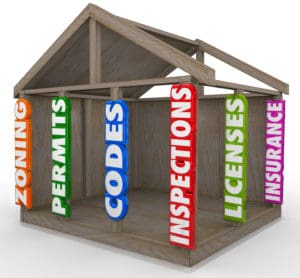 In many instances, navigating the complex regulatory environment surrounding land use planning is the most complicated portion of a new build. It seems that a property owner should have nearly complete autonomy to determine how their land is used. In reality, owners are often constrained by many rules that limit all facets of a new building, starting with its purpose and impacting every detail of its construction.
In many instances, navigating the complex regulatory environment surrounding land use planning is the most complicated portion of a new build. It seems that a property owner should have nearly complete autonomy to determine how their land is used. In reality, owners are often constrained by many rules that limit all facets of a new building, starting with its purpose and impacting every detail of its construction.
Zoning Codes
The first set of regulations a property buyer comes across are zoning laws. Land use planners working for city and county governments create standards for development directed towards achieving the future vision for the area. Usually, those strategic visions are the creation of city councils and county commissioners in conjunction with community participants. Most zoning codes fall within four general categories: industrial, commercial, agricultural, and residential. Residential and agricultural are relatively self-descriptive. Industrial refers to factories, manufacturing facilities, research institutions, and similar entities, while commercial refers to shopping complexes, gas stations, offices, warehouses, entertainment facilities, etc.
Zoning restrictions don’t stop there, though. They become more complex as local municipalities break down those four categories into more specific subgroups. For example, zoning codes for Medford, Oregon, break down the residential zones into eight subcategories from 30 unit multi-family to single family/1 unit districts, create five different commercial designations and three types of industrial zones, and designates another category for public parks. As a result, zoning codes can be so confusing that a hot dog restaurant may be approved in a business park but not a stand-alone business.
Building Codes
Building codes create another layer of complexity as they represent rules and restrictions for construction standards. Many of these laws are based on public health and safety goals, but others are linked to community values for conservation, environmental concerns, or beautification standards. Building codes regulate all facets of construction from setbacks to maximum height and square footage but also get down into the details of curb heights, stair tread sizes, railings, lights and noise levels, pollution control, types of signage, drive-thrus, etc.
Various regulatory bodies manage building codes, making it difficult for property owners to ascertain where to find rules and get the necessary approvals. Some codes are definitive (i.e., “the max height of any structure is 20 feet”), while others can be entirely subjective. (ie, “new construction should not have a potentially detrimental effect on surrounding businesses.”)
These codes can affect almost any new construction depending on the specific location. Permits are proof that the property owner or construction company is performing work according to the regulations and can be required for all stages of construction from demolition to building, fencing, plumbing, or installing an elevator. Some construction projects may require floodplain permits or wetland permits. The list of possible approvals is seemingly endless in many jurisdictions.
If you’re considering new construction or the development of a piece of property, contact the land use planning experts at Richard Stevens & Associates first.
Before you invest in a parcel of property, it’s important to consult with professionals who can walk you through all of the land use issues you need to consider. At Richard Stevens & Associates, we specialize in assisting our clients with obtaining rural and urban land use permits. We can help you consider the pros and cons of different properties so you’ll feel confident about your final decision. Contact us today to learn more about how we can help you bring your dream home to life.
